UP TO THE MINUTE
Building the future with cold-formed steel
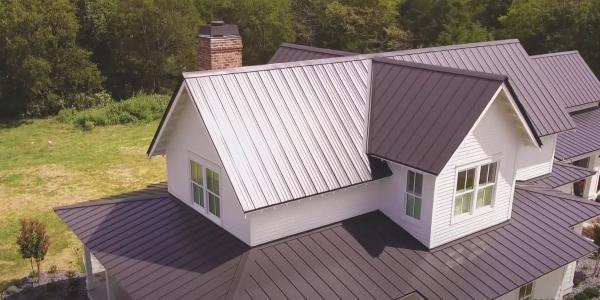
By McElroy Metal.
How a revolutionary approach is reshaping construction.
In a world where speed, efficiency and precision are increasingly paramount, the construction industry is undergoing a quiet revolution. At the heart of this shift is the rise of cold-formed steel buildings, a method that promises not just faster project turnarounds but also sleek, cost-effective solutions that are changing the game for contractors and clients alike. Jason, a seasoned expert with McElroy Metal, shares his journey into this innovative realm and unveils how McElroy’s EasyFrame system is setting new standards in the industry. From lightning-fast production times to a commitment to quality and community, this is more than just a construction story — it's a glimpse into the future of building.
Jason, can you provide some background on how you became involved with cold-formed buildings?
I started working in cold-formed buildings about seven years ago. Coming from a sales background, I didn't know much about them. However, I quickly appreciated their uniqueness and the opportunity to build customer relationships. It felt like I had found my true calling when I first encountered cold-formed buildings.
How long have you been with McElroy now?
I've been with McElroy since late spring of this year. I decided to make the switch for two main reasons: the company's established reputation, with over 60 years in the business and its strong commitment to customers, employees and community. I was also excited by the company's potential for growth.
Let's discuss EasyFrame construction, McElroy's trade name for this type of building. What's the background of this building design?
EasyFrame comes from the cold-formed side of things. One significant advantage is speed. We can produce a quote in 10 minutes, engineer full buildings in five days or less and have a building on the ground in three to four weeks.
For our audience that might not have a background in this, what does cold-formed mean and how is it different from other types of buildings?
Cold-formed means it comes from a cold-formed roll of steel. It's not hot-dipped. The steel goes into a machine that bends it according to our software specifications. This process allows for rapid production and assembly. The buildings bolt together without drilling or cutting required in the field. Some people compare it to a giant erector set.
What are some major benefits of an EasyFrame building?
Speed is a significant advantage. With traditional red iron construction, you're looking at 13 to 16 man-hours to process one ton of steel. With cold-formed steel, it's just one to three hours. The aesthetic appeal is another benefit. The buildings are galvanized steel, without welds that might look unsightly. They have a clean, precise appearance.
There are also cost advantages. For example, stamped engineer and foundation drawings are included, saving upwards of $1,500. The shorter timeline for production and erection is another cost-saving factor.
From a contractor's perspective, what are some advantages and disadvantages compared to traditional construction?
Advantages include not handling heavy I-beams, no welding required and the ability to anchor directly to the foundation without worrying about preset J-bolts. The quick delivery and assembly time mean contractors can potentially complete more projects.
Disadvantages can be a matter of personal preference. Some contractors who have worked with traditional methods for decades might prefer to stick with what they know.
Why would someone choose a McElroy EasyFrame building over a competitor?
McElroy is a well-recognized, respected name with over 60 years in the business. We have 14 manufacturing plants across the country, so we can serve customers efficiently regardless of their location. We also have 29 service centers, 44 metal marts and an extensive distributor network. This means customers will likely be served by someone in their local area who understands their needs.
How challenging is it for contractors to learn how to build these buildings?
Most contractors can pick it up fairly easily. We provide a full set of engineer drawings, a detailed construction packet and a parts list with stamped IDs that tie directly to the construction packet. I always encourage contractors to try two projects – most of the time, they're eager to continue after that.
What are the most challenging aspects of building an EasyFrame roof and how do contractors overcome them?
The main challenge is often finding the right contractor who understands these buildings. While they're not overly complex, they differ from traditional construction methods. I've seen very large, nice buildings put together by husband-and-wife teams or friends working on weekends.
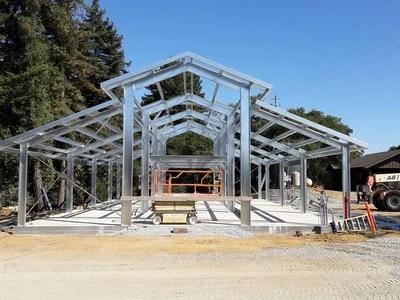
Can you discuss a specific job with unique challenges or on-the-fly changes during installation?
One interesting project was a building on a rail system for a salt mining operation supplying McDonald's®. The building could be moved on rails to allow access to the salt pumps while providing weather protection. It was a unique application of our technology.
What about extreme conditions? Do you have to do anything different with insulation or moisture control?
Insulation is crucial for all steel buildings, regardless of location. Without proper insulation, the building will sweat. We're seeing increasing demands for high R-value insulation, up to R-45 in some cases. Our roof and sidewall systems are designed to accommodate various insulation options.
Do contractors need special tools and equipment for EasyFrame construction?
Not really. Most contractors can work with equipment they already have, like scissor lifts. They'll need basic tools like clamps, a concrete drill, laser level, spud wrenches, cordless drills and impact drivers, aviation snips and possibly a side grinder. It's primarily a bolting and screwing system.
How do you handle training for new crews or distributors?
We don't have a formal training system but hope to roll out training classes in 2025. These will be hands-on sessions led by experienced builders. We're fortunate to work with one of the top cold-form installers in the country and we plan to leverage that expertise in our future training program.
What can impact the timeline for these projects?
The most common issues arise from not taking the time to properly understand the plans, construction packet and parts list. Proper organization of materials on-site is crucial. We've had cases where important components were accidentally used as walkways in muddy conditions, leading to delays.
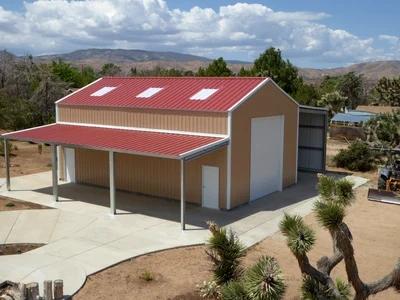
How do EasyFrame buildings interface with components like windows, doors and HVAC systems?
It's similar to traditional buildings. As long as we know the specifications upfront, we can accommodate these elements in the design. This includes considerations for HVAC systems, solar panels or equipment like vehicle lifts. Our engineering process takes all these factors into account.
What about repairs or modifications after the building is complete?
Modifications are possible, but they can be challenging depending on the nature of the change. For example, adding mezzanines or lean-to structures depends on the original building design and available connection points. It's always easier if these elements are planned for in the initial design.
How do you stay updated on new techniques and developments in EasyFrame construction?
Our software constantly evolves and we work closely with our software partner, ACT. We also pay close attention to market trends. For instance, we're seeing increased demand for barndominium-style buildings and more complex designs like wraparound porches. There are some limitations due to the cold-formed steel process, but we're always looking for ways to expand our capabilities.
How can contractors or builders become EasyFrame partners with McElroy?
They can visit our website at McElroyMetal.com and navigate to the "Find a Contractor/Distributor" section. Alternatively, they can email us at EasyFrame@McElroyMetal.com or call our corporate office.
Any final thoughts on minimizing waste and improving efficiency?
We put a lot of effort into ensuring accurate parts counts and proper packaging. This helps minimize waste on the job site. As for efficiency, we've found that taking a team approach and leveraging our supplier network can help avoid delays in components like doors, windows and HVAC systems, which often contribute to budget overruns.
Original article and photo source: McElroy Metal



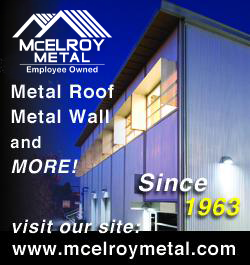
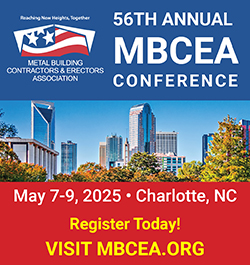







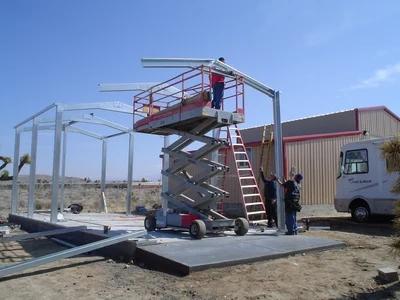







Comments
Leave a Reply
Have an account? Login to leave a comment!
Sign In